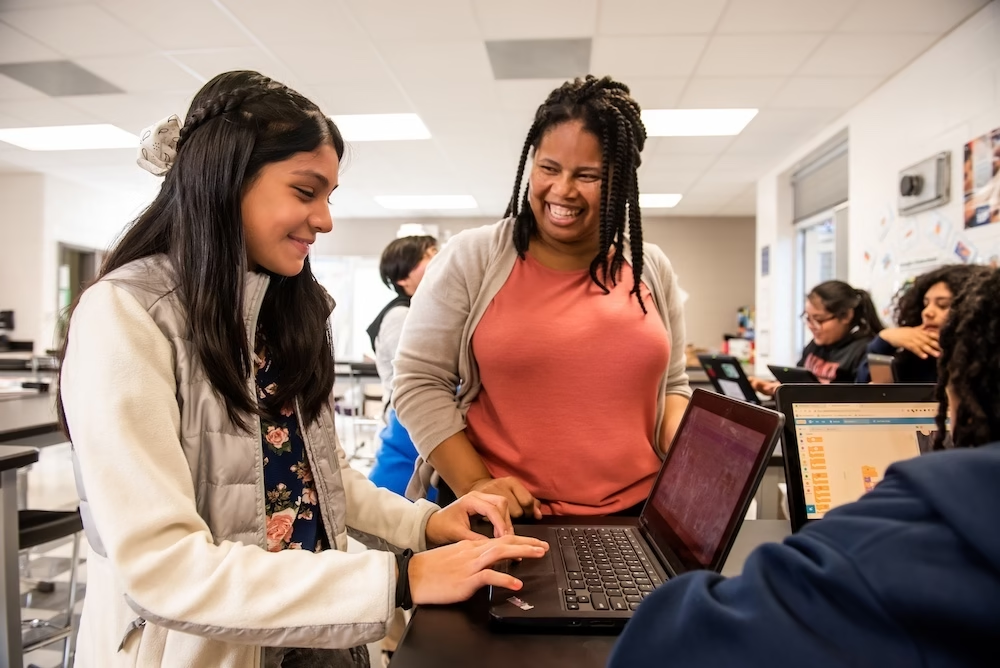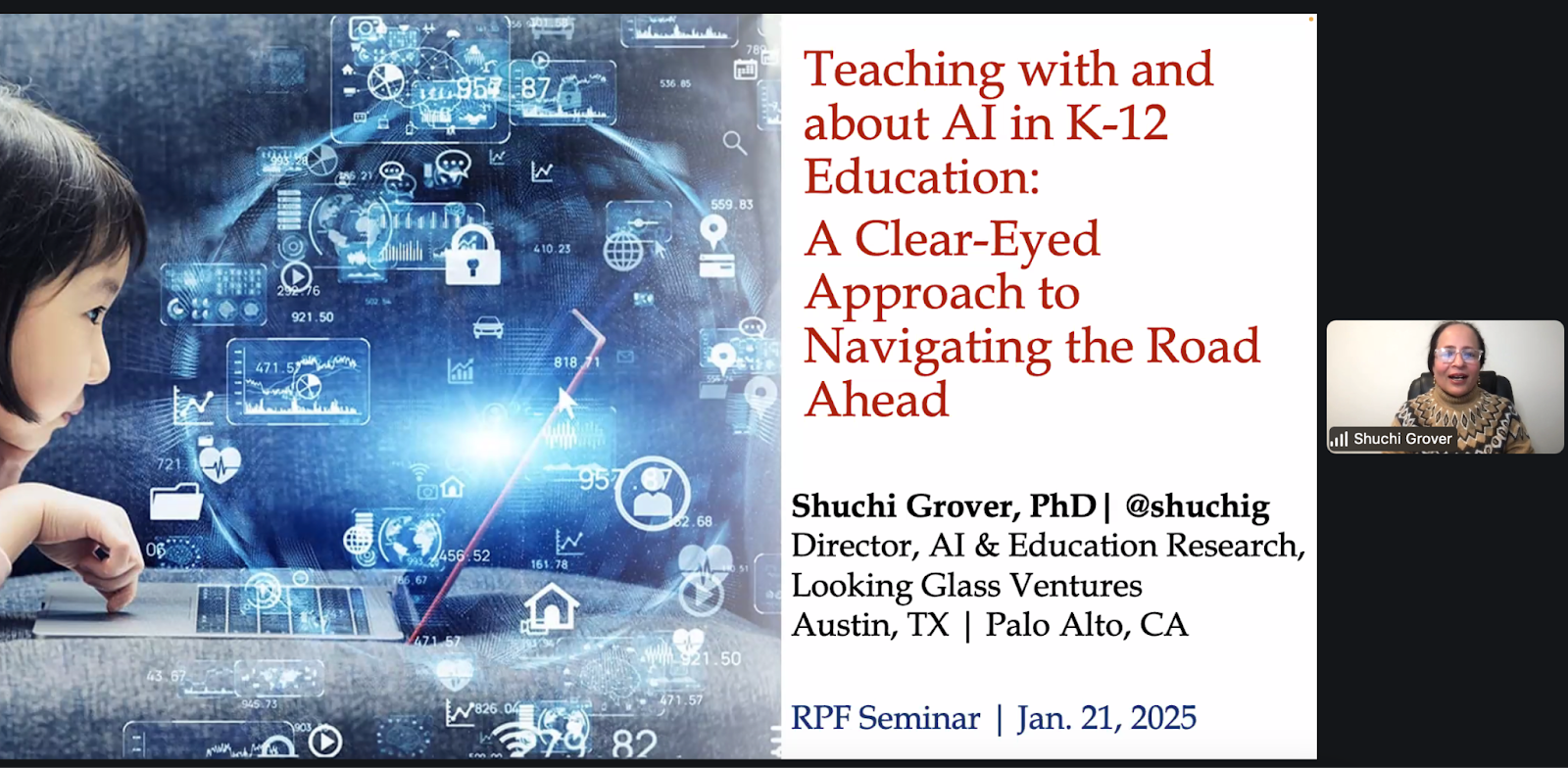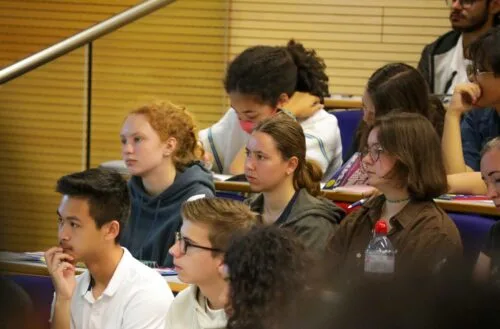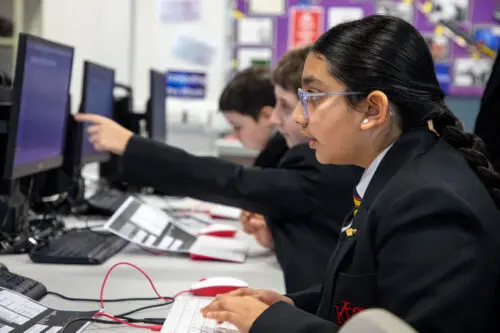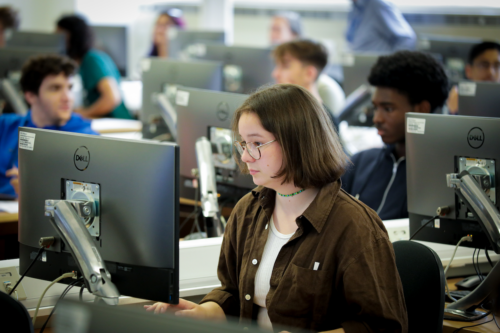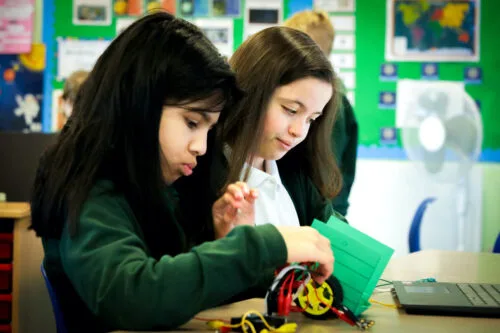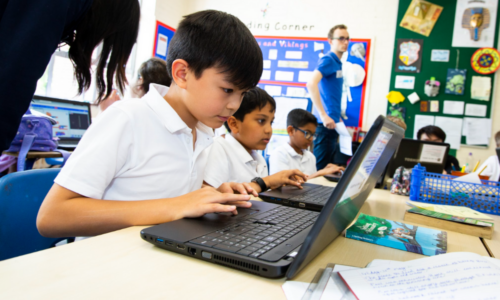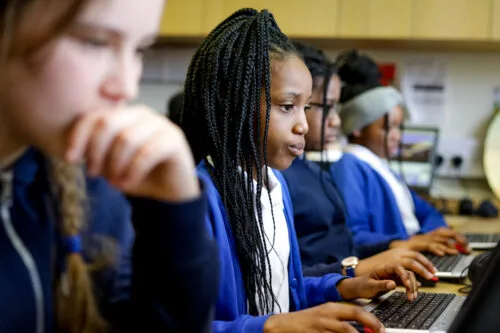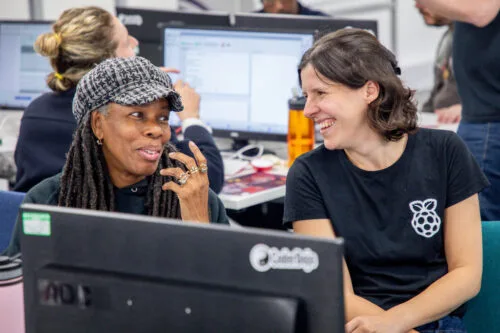Schlagwort: research seminar
-

Promoting young people’s agency in the age of AI
Reading Time: 6 minutesPart of teaching young people AI literacy skills is teaching them to critically think about AI, and to design AI applications that address problems they care about. How to do this was the focus of our June research seminar. Working together to design AI Our June research seminar was delivered by Netta…
-

Bringing data science to life for K–12 students with the ‘API Can Code’ curriculum
Reading Time: 7 minutesAs data and data-driven technologies become a bigger part of everyday life, it’s more important than ever to make sure that young people are given the chance to learn data science concepts and skills. David Weintrop Rotem Israel-Fishelson Peter F Moon In our April research seminar, David Weintrop, Rotem Israel-Fishelson, and Peter…
-

Research insights to help learners develop data awareness
Reading Time: 7 minutesAn increasing number of frameworks describe the possible contents of a K–12 artificial intelligence (AI) curriculum and suggest possible learning activities (for example, see the UNESCO competency framework for students, 2024). In our March seminar, Lukas Höper and Carsten Schulte from the Department of Computing Education at Paderborn University in Germany shared…
-

Supporting teachers to integrate AI in K–12 CS education
Reading Time: 5 minutesTeaching about artificial intelligence (AI) is a growing challenge for educators around the world. In our current seminar series, we are gaining insights from international computing education researchers on how to teach about AI and data science in the classroom. In our second seminar, Franz Jetzinger from the Technical University of Munich,…
-

Integrating generative AI into introductory programming classes
Reading Time: 6 minutesGenerative AI (GenAI) tools like GitHub Copilot and ChatGPT are rapidly changing how programming is taught and learnt. These tools can solve assignments with remarkable accuracy. GPT-4, for example, scored an impressive 99.5% on an undergraduate computer science exam, compared to Codex’s 78% just two years earlier. With such capabilities, researchers are…
-

Teaching about AI in K–12 education: Thoughts from the USA
Reading Time: 5 minutesAs artificial intelligence continues to shape our world, understanding how to teach about AI has never been more important. Our new research seminar series brings together educators and researchers to explore approaches to AI and data science education. In the first seminar, we welcomed Shuchi Grover, Director of AI and Education Research…
-

How can we teach students about AI and data science? Join our 2025 seminar series to learn more about the topic
Reading Time: 4 minutesAI, machine learning (ML), and data science infuse our daily lives, from the recommendation functionality on music apps to technologies that influence our healthcare, transport, education, defence, and more. What jobs will be affected by AL, ML, and data science remains to be seen, but it is increasingly clear that students will…
-

Does AI-assisted coding boost novice programmers’ skills or is it just a shortcut?
Reading Time: 6 minutesArtificial intelligence (AI) is transforming industries, and education is no exception. AI-driven development environments (AIDEs), like GitHub Copilot, are opening up new possibilities, and educators and researchers are keen to understand how these tools impact students learning to code. In our 50th research seminar, Nicholas Gardella, a PhD candidate at the University…
-

Using generative AI to teach computing: Insights from research
Reading Time: 7 minutesAs computing technologies continue to rapidly evolve in today’s digital world, computing education is becoming increasingly essential. Arto Hellas and Juho Leinonen, researchers at Aalto University in Finland, are exploring how innovative teaching methods can equip students with the computing skills they need to stay ahead. In particular, they are looking at…
-

How to make debugging a positive experience for secondary school students
Reading Time: 6 minutesArtificial intelligence (AI) continues to change many areas of our lives, with new AI technologies and software having the potential to significantly impact the way programming is taught at schools. In our seminar series this year, we’ve already heard about new AI code generators that can support and motivate young people when…
-

How useful do teachers find error message explanations generated by AI? Pilot research results
Reading Time: 7 minutesAs discussions of how artificial intelligence (AI) will impact teaching, learning, and assessment proliferate, I was thrilled to be able to add one of my own research projects to the mix. As a research scientist at the Raspberry Pi Foundation, I’ve been working on a pilot research study in collaboration with Jane…
-

Adapting primary Computing resources for cultural responsiveness: Bringing in learners’ identity
Reading Time: 6 minutesIn recent years, the emphasis on creating culturally responsive educational practices has gained significant traction in schools worldwide. This approach aims to tailor teaching and learning experiences to better reflect and respect the diverse cultural backgrounds of students, thereby enhancing their engagement and success in school. In one of our recent research…
-

Empowering undergraduate computer science students to shape generative AI research
Reading Time: 6 minutesAs use of generative artificial intelligence (or generative AI) tools such as ChatGPT, GitHub Copilot, or Gemini becomes more widespread, educators are thinking carefully about the place of these tools in their classrooms. For undergraduate education, there are concerns about the role of generative AI tools in supporting teaching and assessment practices.…
-

Imagining students’ progression in the era of generative AI
Reading Time: 6 minutesGenerative artificial intelligence (AI) tools are becoming more easily accessible to learners and educators, and increasingly better at generating code solutions to programming tasks, code explanations, computing lesson plans, and other learning resources. This raises many questions for educators in terms of what and how we teach students about computing and AI,…
-

Insights into students’ attitudes to using AI tools in programming education
Reading Time: 4 minutesEducators around the world are grappling with the problem of whether to use artificial intelligence (AI) tools in the classroom. As more and more teachers start exploring the ways to use these tools for teaching and learning computing, there is an urgent need to understand the impact of their use to make…
-

Using an AI code generator with school-age beginner programmers
Reading Time: 5 minutesAI models for general-purpose programming, such as OpenAI Codex, which powers the AI pair programming tool GitHub Copilot, have the potential to significantly impact how we teach and learn programming. The basis of these tools is a ‘natural language to code’ approach, also called natural language programming. This allows users to generate…
-

Supporting learners with programming tasks through AI-generated Parson’s Problems
Reading Time: 6 minutesThe use of generative AI tools (e.g. ChatGPT) in education is now common among young people (see data from the UK’s Ofcom regulator). As a computing educator or researcher, you might wonder what impact generative AI tools will have on how young people learn programming. In our latest research seminar, Barbara Ericson…
-

Grounded cognition: physical activities and learning computing
Reading Time: 4 minutesEveryone who has taught children before will know the excited gleam in their eyes when the lessons include something to interact with physically. Whether it’s printed and painstakingly laminated flashcards, laser-cut models, or robots, learners’ motivation to engage with the topic will increase along with the noise levels in the classroom. However,…
-

Integrating computational thinking into primary teaching
Reading Time: 6 minutes“Computational thinking is really about thinking, and sometimes about computing.” – Aman Yadav, Michigan State University Computational thinking is a vital skill if you want to use a computer to solve problems that matter to you. That’s why we consider computational thinking (CT) carefully when creating learning resources here at the Raspberry…
-

Engaging primary Computing teachers in culturally relevant pedagogy through professional development
Reading Time: 8 minutesUnderrepresentation in computing is a widely known issue, in industry and in education. To cite some statistics from the UK: a Black British Voices report from August 2023 noted that 95% of respondents believe the UK curriculum neglects black lives and experiences; fewer students from working class backgrounds study GCSE Computer Science;…
-

Spotlight on teaching programming with and without AI in our 2024 seminar series
Reading Time: 3 minutesHow do you best teach programming in school? It’s one of the core questions for primary and secondary computing teachers. That’s why we’re making it the focus of our free online seminars in 2024. You’re invited to attend and hear about the newest research about the teaching and learning of programming, with…
-

Support for new computing teachers: A tool to find Scratch programming errors
Reading Time: 5 minutesWe all know that learning to program, and specifically learning how to debug or fix code, can be frustrating and leave beginners overwhelmed and disheartened. In a recent blog article, our PhD student Lauria at the Raspberry Pi Computing Education Research Centre highlighted the pivotal role that teachers play in shaping students’…
